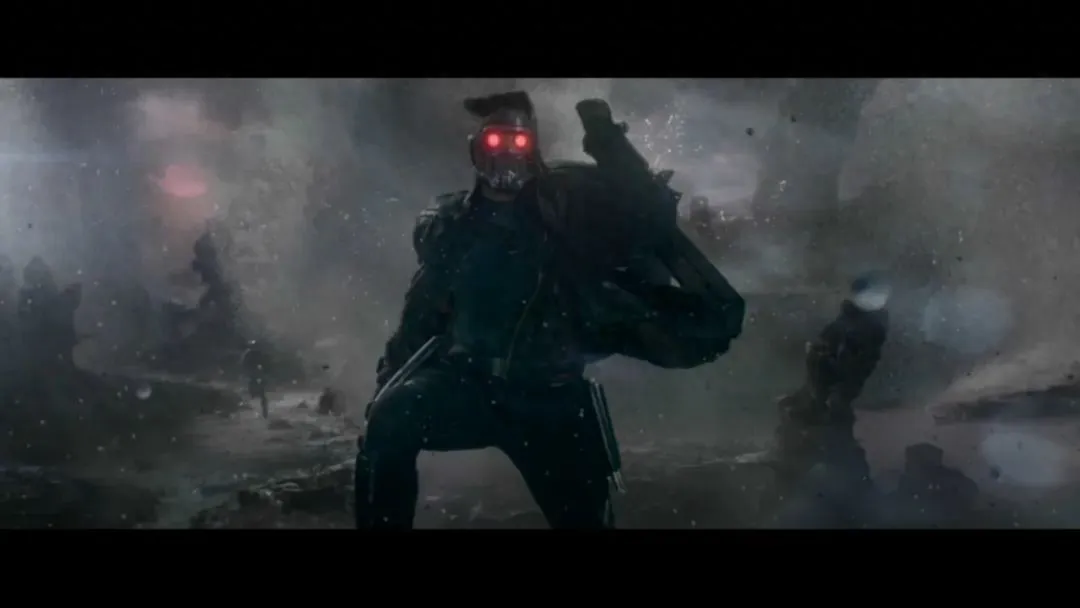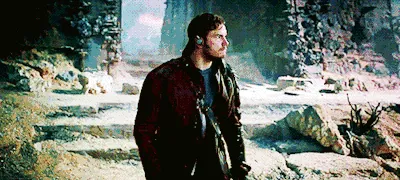The Guardians of the Galaxy Trilogy: A Farewell to the Misfit Heroes
Spoiler Alert!
Major spoilers ahead! Proceed with caution!
The scene opens with Star-Lord jamming to “Come and Get Your Love” by Redbone on his Walkman, busting out some seriously awkward dance moves while taking down alien creatures.
This iconic opening from 2014’s Guardians of the Galaxy set the stage for a hilariously chaotic space adventure.

Star-Lord (Chris Pratt) makes his entrance in Guardians of the Galaxy
As most fans know, the Walkman eventually bit the dust, replaced by a Zune scavenged by Yondu. Star-Lord later gifts this Zune to Rocket, a symbolic passing of the torch. The original Guardians may have disbanded, but Rocket’s new team continues their unique brand of heroism, all while grooving to the same infectiously funky tune, “Come and Get Your Love.” It’s with this “galactic anthem” playing that Guardians of the Galaxy Vol. 3 (2023) draws the curtain.
The most distinctive team in the Marvel Cinematic Universe (MCU) has reached its end with the conclusion of the Guardians of the Galaxy trilogy.
The Guardians of the Galaxy Trilogy Poster
The Superhero Fatigue
In recent years, superhero stories have faced increasing audience fatigue. Renowned director Martin Scorsese famously stated that Marvel movies are “not cinema, but theme parks.” While this sparked controversy among Marvel fans, Francis Ford Coppola echoed the sentiment, agreeing with Scorsese’s assessment.
Commercially and critically, Spider-Man: No Way Home (late 2021) marked a high point for Marvel films. Subsequent MCU releases, while initially strong at the box office, have experienced significant drop-offs, both in revenue and critical reception. Ant-Man and the Wasp: Quantumania (February 2023) fared particularly poorly, with its Rotten Tomatoes score plummeting to 47%, tying it with Eternals as one of the lowest-rated MCU films.
The decline in Marvel’s popularity can be attributed to several factors. The COVID-19 pandemic and its impact on viewing habits are external influences, but the core issue lies in Marvel’s overambitious “universe-building.” The constant barrage of easter eggs and interconnected storylines often overshadows the need for a well-told, self-contained narrative within each film.
Guardians of the Galaxy Vol. 3 was filmed using IMAX “special” cameras
James Gunn’s Vision
Guardians of the Galaxy Vol. 3 manages to avoid the pitfalls of recent Marvel films, largely due to director James Gunn’s unwavering vision. Throughout the production, Gunn insisted on keeping the film focused on the Guardians’ story, resisting the urge to shoehorn in unrelated characters for the sake of broader MCU connections.
Guardians of the Galaxy Vol. 3 still
Gunn’s autonomy was also bolstered by his position at DC Studios, giving him leverage to prioritize his creative vision. Marvel’s decision to retain Gunn for the final two Guardians films was driven not only by his talent but also by the strong support from fans and the cast, including Dave Bautista (Drax), who stood by him amidst past controversies.

Star-Lord’s dance moves have become a signature of the character
As a result, the characters in Guardians of the Galaxy Vol. 3 are primarily focused on serving the trilogy’s narrative. While the film does include a subtle connection to The Marvels (July 2023) in a post-credits scene, it’s handled with restraint, using a newspaper headline as the sole point of intersection.
Spoiler alert: In Guardians of the Galaxy Vol. 3, Groot has an upgraded 360° no-dead-angle shooting scene, but this time he is cooperating with Star-Lord instead of Rocket.
The Guardians’ Legacy
Looking back at the Guardians of the Galaxy trilogy as a whole, a clear narrative arc emerges. The first film (2014) establishes the team’s formation, the second (2017) explores Star-Lord’s origins and his connection to the celestial being Ego, and the third (2023) focuses on Rocket’s past, setting the stage for his leadership of the new Guardians.
Guardians of the Galaxy Vol. 3 still, Rocket was only known as 89P13 as an experimental subject
The overarching theme of the trilogy is “protecting the galaxy.” In the first film, Thanos is a looming presence, with Nebula and Ronan serving as the primary antagonists vying for the Power Stone, one of the six Infinity Stones.
While Star-Lord briefly wields the Power Stone in the first film, his actions only delay Thanos’s plans. Thor: Ragnarok and Avengers: Infinity War reveal that Thanos has already acquired the Power Stone for his gauntlet.
In Guardians of the Galaxy Vol. 2, Star-Lord uncovers Ego’s expansionist scheme, realizing that he and his siblings are merely seeds for Ego’s celestial assimilation of countless planets.
Thanos and Ego share a warped vision of galactic “purity,” a theme that continues in Guardians of the Galaxy Vol. 3 with the High Evolutionary’s twisted plan.
Throughout the trilogy, the Guardians, despite their flaws and quirks, thwart the grand schemes of these villains, highlighting the dangers of those who pursue “good” through “evil” means.
The Guardians of the Galaxy trilogy concludes, leaving behind laughter and heartfelt moments.
Guardians of the Galaxy still, the original five Guardians, this classic scene reappears in Guardians of the Galaxy Vol. 3
Farewell, Star-Lord, Gamora, Drax, Rocket, Groot, Nebula, and Mantis. Together, you were a force to be reckoned with; apart, you shine like stars. While we may see some of you in future Marvel films, the original Guardians of the Galaxy are no more. Although Kraglin, Cosmo, and Adam Warlock possess similar qualities, the new team can only ever be a splinter group of the original.
I’ll remember you with a song: “Having friends is the most romantic thing of all.”